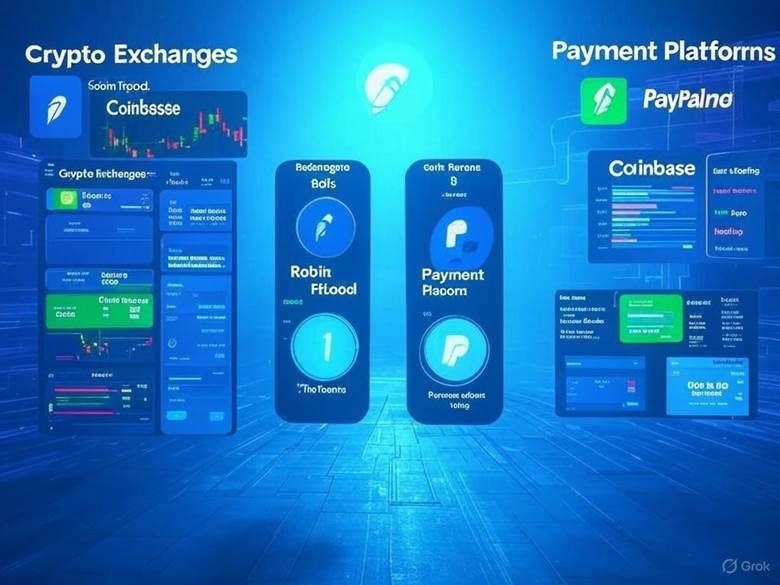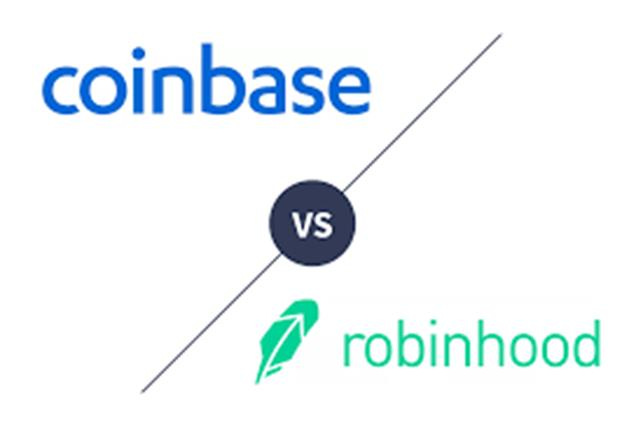In the rapidly evolving world of cryptocurrency, U.S.-based publicly listed companies like Robinhood and Coinbase have established themselves as leading platforms offering crypto exchanges with custodial wallet services. Meanwhile, payment platforms such as Cash App (a product of Block, formerly Square) and PayPal have also entered the crypto arena, allowing users to purchase and interact with digital assets. While these payment platforms share some similarities with traditional exchange interfaces like Robinhood and Coinbase, their offerings differ significantly in scope, functionality, and user experience. Below is an exploration of what Cash App and PayPal provide in the crypto space and how they contrast with the traditional exchange model exemplified by Robinhood and Coinbase.
What Payment Platforms Offer
Cash App (Block)
Cash App, developed by Block, is a peer-to-peer payment platform that integrates Bitcoin (BTC) as its sole cryptocurrency. Users can buy, sell, and withdraw Bitcoin directly through the app, appealing to those seeking a straightforward crypto experience. Cash App supports sending Bitcoin to external wallets or other users instantly via a $Cashtag, reflecting its payment-centric design. It also leverages the Bitcoin Lightning Network for faster, cheaper transactions. The fee structure includes a flat 1.75% fee for Bitcoin purchases, plus a variable service fee based on market conditions, keeping costs transparent and often competitive for small transactions. Block’s broader ecosystem reinforces this focus, with the company holding Bitcoin on its balance sheet, though its merchant-facing Square services do not directly offer crypto purchasing.
PayPal
PayPal, a global payments leader, introduced crypto buying, selling, and holding in 2020, supporting Bitcoin, Ethereum (ETH), Litecoin (LTC), and Bitcoin Cash (BCH). Users can purchase these assets within the PayPal app or its Venmo subsidiary using linked bank accounts, debit cards, or PayPal balances. Fees are tiered, starting at $0.50 for purchases under $25 and dropping to 1.5% for transactions over $1,000, with no separately disclosed spread. Initially, PayPal restricted crypto to its ecosystem, but since 2023, U.S. users can transfer assets to external wallets, enhancing flexibility. PayPal also enables merchants to accept crypto payments via its Checkout with Crypto feature, converting crypto to fiat at the point of sale.
Comparison with Traditional Exchanges (Robinhood and Coinbase)
Cryptocurrency Selection
Robinhood: Supports trading for about 15 cryptocurrencies, including Bitcoin, Ethereum, and Dogecoin, alongside stocks, ETFs, and options. It’s a multi-asset platform with a modest crypto range compared to dedicated exchanges. In that sense, it is a hybrid offering that combines traditional brokerage services and cypto exchange services. They are constantly expanding to related areas such as banking, wealth management, credit cards, etc. as well.
Coinbase: As a crypto-first platform, Coinbase offers over 250 cryptocurrencies and more than 350 trading pairs, catering to users seeking extensive variety and advanced options. They have an easier to use standard interface as well as an Advanced offering that has lower fees.
Cash App: Focuses exclusively on Bitcoin, prioritizing simplicity over diversity.
PayPal: Supports four major cryptocurrencies (BTC, ETH, LTC, BCH), offering more variety than Cash App but far less than Coinbase.
Traditional exchanges like Coinbase target crypto enthusiasts with broad selections, while payment platforms like Cash App and PayPal appeal to mainstream users with limited, popular assets. Robinhood sits in a separate bucket, combining crypto with traditional investments.
User Interface and Experience
Robinhood and Coinbase: Both provide trading-oriented interfaces. Robinhood’s commission-free model (with spreads) and mobile crypto wallet (available on iOS and Android) appeal to most DIY investors across all asset classes. Coinbase offers a user-friendly platform with educational resources and an Advanced Trade mode for experienced users, though its fees can be intricate.
Cash App and PayPal: Rooted in payment systems, these platforms emphasize simplicity. Cash App’s Bitcoin tab is minimalistic, ideal for quick buys or sends, while PayPal integrates crypto into its familiar payment flow. Neither offers advanced trading tools like limit orders or charting, unlike Robinhood and Coinbase.
Payment platforms leverage existing user bases and ease of use, contrasting with the trading-focused, feature-rich interfaces of traditional exchanges.
Fees and Costs
Robinhood: Promotes no commission fees, but users pay a spread (typically 0.1% or higher), which lacks transparency and can subtly raise costs.
Coinbase: Applies a 0.5% spread plus variable fees (e.g., 1.49% for bank transfers, up to 3.99% for debit cards), higher but detailed. Advanced Trade offers maker-taker fees (0% to 0.6%).
Cash App: Charges a 1.75% fee plus a variable service fee, often lower than Coinbase for small Bitcoin buys, with no hidden spreads explicitly noted.
PayPal: Uses a tiered fee model (e.g., 2.3% for $25-$100, 1.5% for over $1,000), competitive for small purchases but less flexible than exchange structures.
Payment platforms offer simpler, sometimes cheaper fees for casual users, while exchanges provide more options (and complexity) for active traders.
Custody and Withdrawals
Robinhood: Now offers a crypto wallet on iOS and Android, allowing withdrawals to external wallets as of recent updates, reversing its earlier restriction and aligning more with crypto ownership principles.
Coinbase: Provides custodial wallets with immediate withdrawal options to external wallets, emphasizing user control.
Cash App: Allows Bitcoin withdrawals to external wallets, supporting crypto’s decentralized ethos.
PayPal: Permits withdrawals to external wallets since 2023, closing the gap with exchanges after an initial restrictive phase.
With Robinhood’s wallet addition, all platforms now support withdrawals, though Coinbase’s immediacy and breadth remain distinctive for crypto-exclusive investors.
Additional Features
Robinhood: Integrates crypto with stocks and options, targeting diversified investors, with new offerings appearing at a rapid pace.
Coinbase: Offers staking (up to 12% APY on select coins), a Coinbase Card, educational rewards, and an NFT marketplace, appealing to crypto enthusiasts.
Cash App: Includes peer-to-peer Bitcoin transfers and Lightning Network support, enhancing payment utility but lacking broader crypto features.
PayPal: Enables crypto payments at merchants and Venmo integration, focusing on spending rather than trading or staking.
Traditional exchanges provide richer crypto-specific features, while payment platforms emphasize integration with payment ecosystems.
Key Differences and Implications
Payment platforms like Cash App and PayPal embed crypto within familiar payment contexts, targeting users who prioritize convenience over advanced trading, with Cash App’s Bitcoin-only focus and PayPal’s multi-coin spending options. Their simplified interfaces and limited offerings contrast with the comprehensive, trading-centric environments of Robinhood and Coinbase. Robinhood’s mobile wallet and multi-asset approach bridge traditional investing and crypto, while Coinbase excels in depth and versatility for crypto purists. Cash App’s withdrawal capability and Lightning Network support blend payment simplicity with some crypto flexibility, while PayPal’s merchant integration caters to practical use cases.
For casual users making small purchases, payment platforms may suffice. For investors valuing control, variety, or advanced features, traditional exchanges remain superior.
Crypto Exchanges to Consider Opening an Account:
1. Robinhood.
2. Coinbase.



